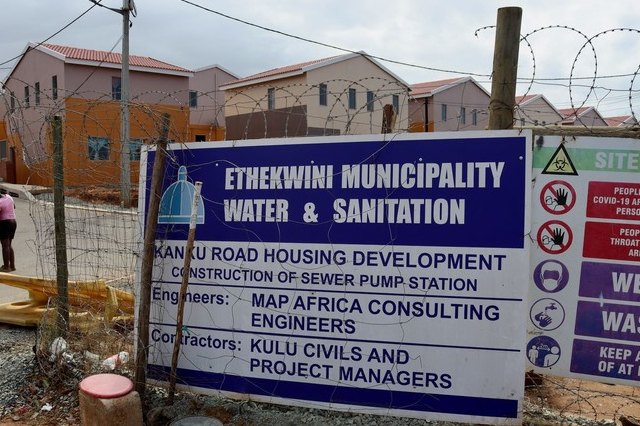About 40 families from Isipingo transit camp, who have occupied RDP houses in Kanku Road without municipal approval, say they are the rightful beneficiaries. Photo: Manqulo Nyakombi
By Nombulelo Damba-Hendrik and Tsoanelo Sefoloko
GroundUp
- In June Isipingo “transit camp” families, who were forced to make way for the FIFA World Cup stadium in Durban 2009, finally began to be relocated to RDP houses in Kanku Road.
- When the relocation was delayed, 38 families occupied houses without authorisation.
- This was after a stranger told them she had bought one of the houses and was moving in. She was in possession of the keys.
About 40 families from Isipingo transit camp, 20km south of Durban, occupied RDP houses in Kanku Road in August. Last week an attempt to lock them out of the houses failed. The occupiers have vowed to stay put. They say they are the rightful beneficiaries and municipal officials tried to sell one of the houses meant for them.
The R170-million Kanku Road housing project to house 360 families started in 2020 and was completed in March 2023. KwaZulu-Natal Department of Human Settlements spokesperson Mbulelo Baloyi said the project was to house the people of Isipingo Transit Camp, who were originally removed from informal settlements in Umlazi Township in 2009, to make way for the King Zwelithini Stadium ahead of the 2010 FIFA World Cup.
Baloyi said, starting 28 June, the eThekwini Municipality relocated families in batches of 20 to Kanku Road.
Community leader Ayanda Mnguni said that at the end of July the relocation stopped. The people left behind are those who then occupied the RDP houses in August without authorisation.
She said people had been in the transit camp since 2009 and lived in leaking shacks and had endured half a dozen floods. “Some didn’t have roofing,” she said.
Those left behind had also become easier targets for criminals.
Then rumour spread that the RDP houses were being sold by municipal officials.
“Before we made a decision to move people in, we were informed about a lady trying to move into one of the empty houses … That woman told us that she bought the house and she got the house keys from municipal offices in Shell House,” said Mnguni.
The woman fled. The community kept the keys and the house is now occupied.
Mnguni said they informed the municipality but heard nothing back.
The community leaders then decided to occupy the houses and 38 families took the opportunity. They were moved into houses with the numbers given to them by the municipality when they were still in the transit camp. Some people, however, said they would rather wait for the municipality, and they have remained at Isipingo.
EThekwini Municipality spokesperson Gugu Sisilana said there are families in the transit camp who were not there originally. She said out of the remaining families legitimate occupants were still being verified.
“What pisses me off is that the municipal officials were called when that woman was caught trying to move in at night,” says Nosicelo Matheni, 63, who with her two daughters and four grandchildren is occupying one of the houses. “That woman was clear that she bought the house, but the officials did nothing.”
“Now that we moved on our own, they want to evict us. Why? We don’t have a problem with their verification but they must do it while we are living in our houses, because we don’t trust them,” she said.
Matheni said she refuses to return to the transit camp.
“Before we moved here we almost got attacked. I was the only house close to the bushes. We just got lucky that those boys ran away when I shouted for help,” she said.
Follow African Insider on Facebook, Twitter and Instagram
Picture: GroundUp
For more African news, visit Africaninsider.com


